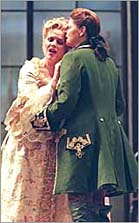When Sopranos Onstage Match a Librettist's Vision
'Der Rosenkavalier' at the Metropolitan Opera
BERNARD HOLLAND
01/22/00
The betting had been on the voices, a trifecta of soprano thoroughbreds that could not miss. And at the finish line ・certainly one of the most beautiful ever devised ・there they were, neck and neck: Rene Fleming as the Marschallin, Susan Graham as Octavian and Heidi Grant Murphy as Sophie singing the trio that has broken the hearts of opera lovers for almost a century.
 |
|
| Rene Fleming, left, and Susan Graham. (Sara Krulwich/The New York Times) | |
The opera, of course, was "Der Rosenkavalier" by Richard Strauss, not his last paean to the female voice but perhaps his truest. Although the Metropolitan Opera's production is 30 years old, the summoning of this much singing talent to one stage had something fresh about it on Thursday night. The voices were pretty much what our operatic racing forms had touted them to be, but voices were not the substance of the evening.
Suspension of disbelief is the usual evening's work at the opera house. Ticket buyers faced with the overweight soprano, the aged tenor or the incredible plot treat such inconveniences as a kind of surcharge: any fee will be paid to get to the melting sound, the tenorial throb or the languid melodic line. "Der Rosenkavalier," with a libretto by Hugo von Hofmannsthal as real, as subtle and as touching as its music, suffers sorely from such transactions. The opera's intersection of young love and fading beauty has a humanity that demands credibility. The Three Sopranos may inhabit a Viennese palace, but their progress is guided by irreducible facts of life that touch anyone who has loved and lost.
These elements formed the background of Thursday's impressive success. For here we could look up to the stage and see without fear of compromise the people Hofmannsthal might himself have imagined. The three voices ・each one of high quality ・were very different in timbre and size; and just as Ms. Graham looked the perfect Octavian, so her clear, assertive voice sounded like him too. Equally successful was Ms. Fleming, a Marschallin who finds the languid desperation behind the frenetic goings-on of Act I.
The splendidly calculated and yet very natural interaction between Ms. Fleming and Ms. Graham must have come as much from previous collaborations in other opera houses as from Bruce Donnell, the stage director for this revival. The physical comedy of Acts II and III degenerated too often into slapstick, but whatever contribution Mr. Donnell made to the exquisite timing in the love scenes deserves credit. Ms. Fleming sang not just beautifully but touchingly. I had a little trouble hearing her in Act I, the impression being not of a voice too small but of a stage too big. Gradually the acuteness of her portrayal drew one closer, and her vocal presence at the end was large.
Ms. Murphy's Sophie is long on rambuctiousness and a little short on tender femininity, but when she sang those pure, reedy pianissimos, the ear was supplied with qualities the eye might have been denied. Franz Hawlata was an unusually svelte Baron Ochs; otherwise his performance followed soundly in the tradition of Ochses. Hans-Joachim Ketelsen (Faninal), Wendy White (Annina), Anthony Laciura (Valzacchi) and Julia Faulkner (Marianne) were all strong performers.
The production by Nathaniel Merrill and Robert O'Hearn has aged gracefully and retains its sense of grandness. One tires of having to find new ways to say how well the Met Orchestra plays for James Levine, but one does not tire of listening to them. Strauss's exquisite, lapidary orchestra writing is what these players and their conductor manage better than almost anyone.